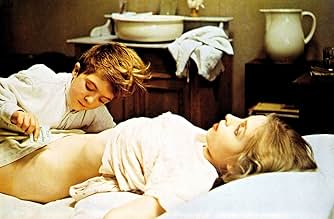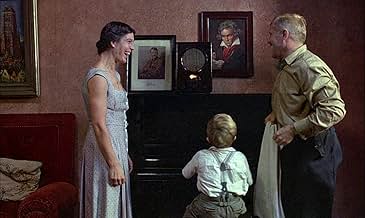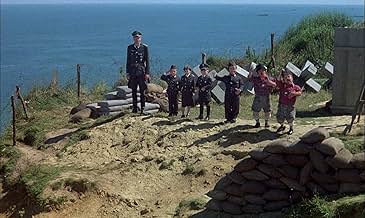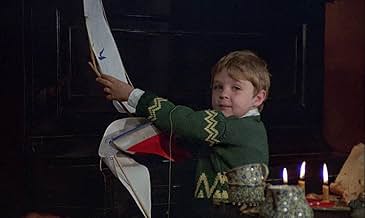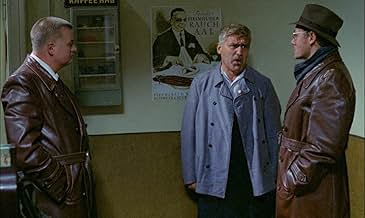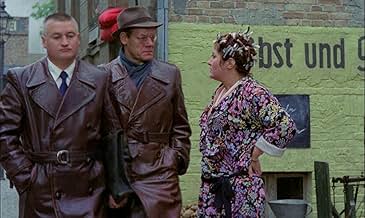Nel 1924, Oskar Matzerath nasce nella Città Libera di Danzica. All'età di tre anni, cade da una rampa di scale e smette di crescere. Nel 1939 scoppiò la seconda guerra mondiale.Nel 1924, Oskar Matzerath nasce nella Città Libera di Danzica. All'età di tre anni, cade da una rampa di scale e smette di crescere. Nel 1939 scoppiò la seconda guerra mondiale.Nel 1924, Oskar Matzerath nasce nella Città Libera di Danzica. All'età di tre anni, cade da una rampa di scale e smette di crescere. Nel 1939 scoppiò la seconda guerra mondiale.
- Regia
- Sceneggiatura
- Star
- Vincitore di 1 Oscar
- 18 vittorie e 6 candidature totali
- Lina Greff
- (as Andréa Ferreol)
- Der Alte Heilandt
- (as Helmuth Brasch)
Recensioni in evidenza
The Tin Drum is based on Gunter Grass's highly acclaimed novel which used magic realism to capture the madness of war, and the folly of the people who made it possible. This movie only tackles the first two sections of the novel, leaving out the post-war events. The film won the Academy Award for Best Foreign film in 1980, and the Palm d'Or at Cannes. It was also banned in Oklahoma as "child pornography". Despite moments of brilliance, The Tin Drum left me feeling incomplete and curiously unmoved.
It is a very different kind of film from the others I saw this week, using satire and surrealism to explore people's reactions during the period from 1939 to 1945. It seems to be saying that it is all right to stop growing (that is, participating in the world) as a protest against the cynicism and corruption of the adult world. The setting for the majority of the film, Danzig (now Gdansk) is a major northern port town in Poland. Danzig was a free and independent city until September 1, 1939, when it became the first region taken by Germany at the outset of WWII. After the war, Danzig became a part of Poland again.
The Tin Drum is the story of Oskar Matzerath, a boy who grows up in Eastern Germany before and during World War II. Oskar decides the only way to protest being part of the adult world is by banging on his drum and remaining a child forever. This is his rebuttal of society and his tin drum is his protest against the mentality of his family and neighborhood, or perhaps against all passive people in Nazi Germany at that time. Oskar tries to shock the world out of its inhumanity. His life reflects Germany's struggle to free itself from its own dream of Teutonic superiority and find peace in the national soul.
David Bennent as Oskar gives an outstanding performance, creating a character that is both haunting and frightening. He looks like a little man in a child's body but his eyes are deep and have a very knowing look that seemed to be looking right through me.
Oskar is not a cute little updated version of Peter Pan. Since age three (when he was given his first tin drum), Oskar can scream with such a high pitch that he can shatter any piece of glass. He even controls his scream to the point where he can break windows on the other side of the city, or etch writing into glass. Oskar uses his ability to manipulate and control the adult world, often using vicious and cynical snide comments about the insanity around him. At one point, he disrupts a Nazi rally by changing the beat of his tin drum to the Blue Danube which the band then follows. The ensuing scene where the crowd breaks into a dance and the rain comes down leaving the Nazi soldiers bewildered is one of the best in the film.
I found the scenes where Oskar joins a midget troupe and finds loving companions of his own kind to be very tender and moving. However, the film became morally ambiguous for me when Oskar and his troupe decide to entertain the Nazi soldiers at the front lines. Schlondorff never really makes it clear what his motivations are and Oskar's actions seems to contradict his essentially anarchist protest for most of the film. The Tin Drum also contains some objectionable scenes of childhood sexuality and grotesque depictions of slithering eels being caught using a severed horse head as bait. The result, needless to say, is stomach churning.
I found The Tin Drum to be absorbing and thought provoking yet, despite moments of brilliance, for me it did not add up to a totally satisfying experience.
Things I saw in this movie that vividly stuck in my brain are such things as a huge eel being pulled out of a severed horses head that was just dragged from the sea on a rope, a soldier having carnal knowledge with a lady in the middle of a field while being hunted by another soldier, a young boy spitting into a hand of a young girl ...
And I could go on. This movie I found to be extremely unique and varied in many ways. I don't know that I can really recommend this movie all in all, but if you do watch it, be prepared for a very unique experience film wise.
Beamer
I do wonder how much of my love for this film is owed to the Gunter Grass novel on which it's based It's a quirky slab of magic realism to be sure, like the film, but I have no idea how closely it hews to the original.
The performances are nuanced and striking in places. The cinematography is appropriately dreary and the editing crisp and unadorned. The centerpiece though, is the performance by the child actor at the core of the film. How much is owed to his voice-over narrative, I don't know, but the man growing inside of the still-grown little boy was handled just beautifully.
It's a disturbing and strangely uplifting movie at once. I recommend it -- especially for those who have seen only black and white view of World War II and the typically American view of our adversaries in German.
Lo sapevi?
- QuizDavid Bennent has a condition which caused him to grow very slowly. When he appeared in this film at age 11, he was 1.14 meters (3 ft. 9' in.) tall. He continued to grow to 1.55 m (5 ft. 1 in), and was still growing well into his thirties.
- BlooperWhile the German soldiers attack the Polish post office, one fires an MG42 machine gun from his shoulder. The German army didn't use that weapon before 1942. It's also not supposed to be fired while standing.
- Citazioni
Oskar Matzerath: There once was a drummer. His name was Oskar. He lost his poor mama, who had eat to much fish. There was once a credulous people... who believed in Santa Claus. But Santa Claus was really... the gas man! There was once a toy merchant. His name was Sigismund Markus... and he sold tin drums lacquered red and white. There was once a drummer. His name was Oskar. There was once a toy merchant... whose name was Markus... and he took all the toys in the world away with him.
- Versioni alternativeAlthough reluctant to do so the BBFC were forced to remove 19 secs from UK cinema and video versions under the Protection of Children Act to remove a scene showing Oskar pressing his face against Maria's pubic region. The cuts were waived in 2003 when it was decided that the scene did not constitute an indecent image.
- ConnessioniFeatured in Pieces of Silver (1989)
I più visti
Dettagli
- Data di uscita
- Paesi di origine
- Sito ufficiale
- Lingue
- Celebre anche come
- El tambor de hojalata
- Luoghi delle riprese
- Aziende produttrici
- Vedi altri crediti dell’azienda su IMDbPro
Botteghino
- Lordo in tutto il mondo
- 7469 USD
- Tempo di esecuzione2 ore 22 minuti
- Colore


